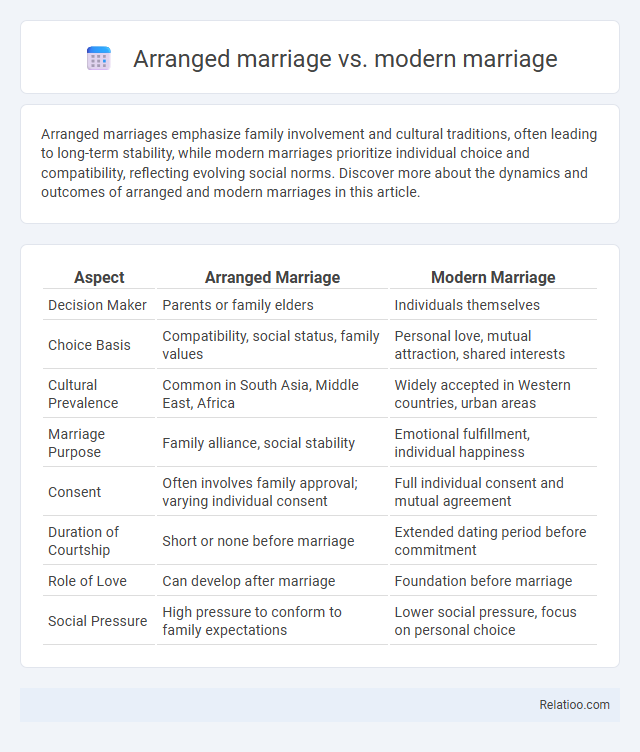Arranged marriages emphasize family involvement and cultural traditions, often leading to long-term stability, while modern marriages prioritize individual choice and compatibility, reflecting evolving social norms. Discover more about the dynamics and outcomes of arranged and modern marriages in this article.
Table of Comparison
| Aspect | Arranged Marriage | Modern Marriage |
|---|---|---|
| Decision Maker | Parents or family elders | Individuals themselves |
| Choice Basis | Compatibility, social status, family values | Personal love, mutual attraction, shared interests |
| Cultural Prevalence | Common in South Asia, Middle East, Africa | Widely accepted in Western countries, urban areas |
| Marriage Purpose | Family alliance, social stability | Emotional fulfillment, individual happiness |
| Consent | Often involves family approval; varying individual consent | Full individual consent and mutual agreement |
| Duration of Courtship | Short or none before marriage | Extended dating period before commitment |
| Role of Love | Can develop after marriage | Foundation before marriage |
| Social Pressure | High pressure to conform to family expectations | Lower social pressure, focus on personal choice |
Introduction to Arranged and Modern Marriages
Arranged marriages typically involve families selecting partners based on cultural, social, and economic compatibility, emphasizing long-term commitment and collective decision-making. Modern marriages prioritize personal choice and romantic love, often focusing on individual compatibility, shared interests, and emotional connection. You can weigh these approaches by considering cultural values, relationship goals, and personal preferences in your search for a life partner.
Historical Context of Arranged Marriages
Arranged marriages have historically dominated societies, particularly in South Asia, serving as strategic alliances to strengthen family ties, secure social status, and preserve cultural traditions. Unlike modern marriages, which often emphasize personal choice and romantic love, arranged unions were primarily influenced by familial obligations and economic considerations. The persistence of arranged marriages reflects deep-rooted social structures that contrast with the evolving values in contemporary marital practices.
Evolution of Modern Marriage Concepts
Modern marriage concepts have evolved by integrating individual choice, emotional compatibility, and gender equality, contrasting sharply with traditional arranged marriages that emphasize family decisions and social alliances. Unlike previous eras where arranged marriages dominated societal structures, contemporary unions prioritize personal fulfillment, mutual respect, and partnership. This evolution reflects broader cultural shifts towards autonomy, changing gender roles, and the impact of globalization on relationship dynamics.
Cultural Perspectives on Marriage Practices
Arranged marriage, rooted in collectivist cultures, emphasizes family involvement and social alliances, often prioritizing compatibility based on shared values and traditions. Modern marriage reflects individual choice and romantic love, influenced by progressive ideals and personal autonomy in Western societies. Your understanding of these cultural perspectives highlights how marriage practices vary globally, balancing tradition and modernity in shaping intimate relationships.
Pros and Cons of Arranged Marriage
Arranged marriage offers benefits such as strong family support, shared cultural values, and often lower divorce rates due to careful compatibility assessments by families; however, it may limit individual choice and personal compatibility. Modern marriage emphasizes personal freedom, mutual love, and individual preferences but can face challenges like higher divorce rates and societal pressures. Arranged marriages blend tradition with family involvement, balancing social stability and commitment yet sometimes lacking the emotional foundation found in modern marriages.
Advantages and Challenges of Modern Marriage
Modern marriage offers greater personal freedom and compatibility as partners choose each other based on mutual interests, values, and emotional connection, fostering a strong foundation for relationship satisfaction. Challenges include navigating evolving gender roles and balancing individual aspirations with shared commitments, which may require effective communication and adaptability. Unlike arranged marriages that rely on family mediation and cultural traditions, modern marriages emphasize autonomy but may face higher rates of conflict and divorce due to differing expectations.
Family Involvement in Partner Selection
Family involvement in partner selection varies significantly among arranged, modern, and semi-arranged marriages. In arranged marriages, families play a central role by actively choosing and approving potential partners based on compatibility, social status, and cultural values. Your experience in modern or semi-arranged marriages may differ, with modern marriages emphasizing individual choice and autonomy, while semi-arranged marriages blend family input with personal preferences.
Autonomy and Personal Choice in Marriage
Arranged marriage often emphasizes family involvement and traditional values, which can limit Your autonomy by prioritizing collective decision-making over individual preferences. Modern marriage typically highlights personal choice and mutual consent, allowing individuals greater freedom to select partners based on love and compatibility. The balance between arranged and modern marriage models reflects evolving cultural norms around individual autonomy and the role of personal agency in lifelong commitments.
Success Rates and Relationship Satisfaction
Arranged marriages often report higher success rates due to familial support and shared cultural values, contributing to long-term stability, while modern marriages emphasize individual choice, which can lead to greater initial relationship satisfaction but sometimes lower longevity. Studies indicate higher relationship satisfaction in modern marriages during early years, but arranged marriages tend to improve satisfaction over time as partners grow accustomed and develop mutual respect. Cross-cultural research highlights that success rates and satisfaction vary significantly with societal norms, economic factors, and communication styles shaping marital outcomes in both systems.
Future Trends in Marriage Traditions
Future trends in marriage traditions indicate a blending of arranged and modern marriage practices, with increasing emphasis on personal choice aligned with family values. Advancements in technology and globalization are reshaping matchmaking processes, allowing Your preferences to merge with traditional customs. Data-driven matchmaking platforms and evolving cultural attitudes suggest a hybrid approach will dominate future marriage landscapes.

Infographic: Arranged marriage vs Modern marriage
 relatioo.com
relatioo.com